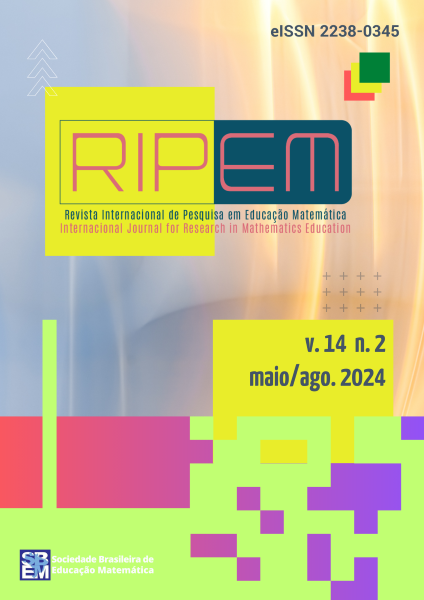Mathematical thinking in Call of Duty Mobile (2019): a dialogue with Mathematics teaching
DOI:
https://doi.org/10.37001/ripem.v14i2.3737Keywords:
Digital Games, Mobile Games, Call of Duty Mobile, MathematicsAbstract
The present work aims to understand how mathematical aspects are highlighted by the game Call of Duty Mobile (2019) in its design, operation and gameplay. The study is an empirical documentary and qualitative research, with identification and analysis of mathematical data present in the game. Data was collected through observation and analysis of the game. In this way, it was observed that there is the possibility of developing concepts to understand Mathematics in situations involving fundamental operations, ratios, algebraic expressions, equations; knowledge of the Statistics area, such as mode, median and mean, analysis of graphs and tables and combinatorial analysis, such as FCP — Fundamental Counting Principle, among others. In conclusion, it was noted that it is possible to use the game so that players, in general, create simulations supported by mathematical calculations to beneft themselves, as well as the possibility of understanding how teachers can use games in mathematics classes.
Downloads
References
Activision, Tencent Games, Timi Studio Group. (2019) Call Of Duty Mobile (Mobile) [Jogo eletrônico].
Aguiar, A. P. S. (2020). Reflexões sobre o uso de jogos digitais no ensino de língua portuguesa à luz da BNCC. In: J. Mattar. (Org.). Relatos de pesquisas em aprendizagem baseada em games. São Paulo, SP: Artesanato Educacional.
Apresentação, K. R. S. & Teixeira, R. R. P. (2014). Jogos em sala de aula e seus benefícios para a aprendizagem da matemática. Revista Linhas, 15(28), 302-323.
Esquincalha, A. C.; Vaiano, A, Z.; Castro, P. M. R. (2016). Transformações em gráficos de funções com Geometria Dinâmica. In Anais do XII Encontro Nacional de Educação Matemática (pp. 1-09). São Paulo, SP.
Iezzi, G.; Murakami, C. (2013). Fundamentos de Matemática Elementar, 1: conjuntos, funções. (9. ed.) São Paulo, SP: Atual.
Lemos, A. F. (2020). Literatura e videogame: como pesquisar e analisar videogames dentro dos Estudos Literários (v. 1). Vitória, ES: Pedregulho.
Lemos, A. F.; Clemente, B. G. R.; Dias, E. L.; Colombo, J. N. (2018). Desafios éticos e metodológicos na criação de Farming games. Revista Ifes Ciência, 4(2), 104-12
Lima, D. (2022). 3 em cada 4 brasileiros jogam algum game, indica pesquisa. The Enemy. Recuperado de: https://www.theenemy.com.br/mobile/pesquisa-game-brasil2022-geral.
Mattar, J; Kolbe Junior, A.; Soares, J. L.; Schneider, E. I. (2020). O uso do Banco Imobiliário no ensino de contabilidade: revisão de literatura. In: J. Mattar. (Org.). Relatos de pesquisas em aprendizagem baseada em games (pp. 52-61). São Paulo, SP: Artesanato Educacional.
Mendes, R. M.; Grando, R. C. (2008). O jogo computacional SimCity 4 e suas potencialidades para as aulas de Matemática. Zetetike, 16(1), 118-154.
Quiroz, V. B. A. R.; Andre, C. F.; Peixoto, C. S. (2020). Estudos sobre plataforma de gamificação no ensino superior. In: J. Mattar. (Org.). Relatos de pesquisas em aprendizagem baseada em games (pp. 30-40). São Paulo, SP: Artesanato Educacional.
Souza, J. P. F.; Matos, G. N.; Rosa, C. C. (2019). Conversando sobre Free Fire: articulando modelagem matemática e tecnologias digitais. In Anais do XII Seminário Sul-Mato-Grossense de Pesquisa e Educação Matemática (pp. 255-265). Campo Grande, MS.
Published
How to Cite
Issue
Section

This work is licensed under a Creative Commons Attribution-NonCommercial-ShareAlike 4.0 International License.








